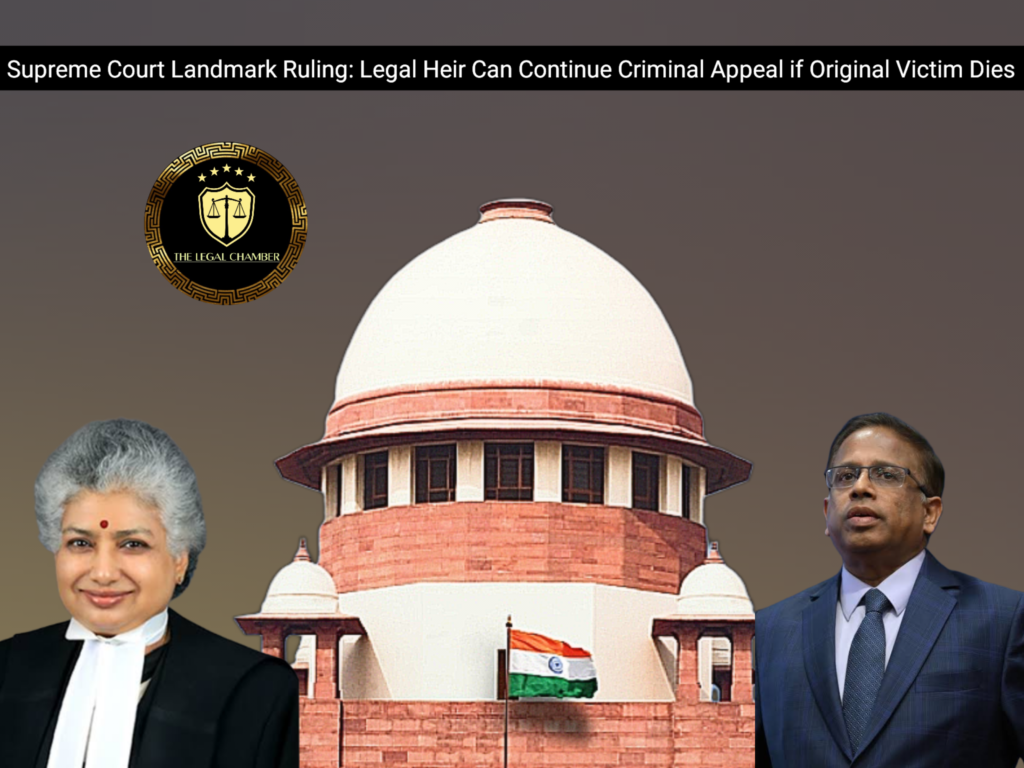This Supreme Court judgment clarifies that the legal right of a victim to prefer an appeal under Section 372 CrPC includes the right to prosecute it. The Supreme Court held that upon the death of the original victim-appellant, their legal heir is entitled to be substituted to continue the appeal, ensuring the victim’s statutory right is not extinguished.
Facts Of The Case:
On December 9, 1992, an attack occurred stemming from previous enmity. The accused persons, armed with guns, sharp weapons, and bricks, assaulted informant Tara Chand (PW-1), his brother Virendra Singh, and his son Khem Singh (PW-3). As a result, Virendra Singh died, while Tara Chand and Khem Singh sustained injuries. The specific roles attributed were that accused Ashok fired at Virendra Singh, accused Pramod fired at Khem Singh, and accused Anil @ Neelu fired at Khem Singh’s wife, Smt. Mithilesh.The Sessions Court convicted these three accused, sentencing Ashok to life imprisonment under Section 302 IPC, and Pramod and Anil to life under Section 302/34 IPC, alongside other sentences. However, the High Court, in a cryptic judgment, allowed the appeals of the convicted accused and acquitted them. The State did not challenge this acquittal. The original appellant, Khem Singh (an injured victim), appealed to the Supreme Court against this acquittal. During the pendency of these appeals, Khem Singh died, leading to a crucial legal question on whether his son, Raj Kumar (also an injured victim), could be substituted to continue the appeals. The core issue before the Supreme Court was the abatement of a victim’s appeal upon their death.
Procedural History:
The case originated from the conviction of the accused by the Sessions Court, Haridwar, in 2004. Aggrieved by their conviction, the accused filed appeals before the High Court of Uttarakhand at Nainital. In 2012, the High Court allowed these appeals, setting aside the convictions and acquitting the accused through a common judgment. The State did not file an appeal against this acquittal. Instead, Khem Singh, an injured victim, exercised his right under the proviso to Section 372 of the CrPC and filed Special Leave Petitions before the Supreme Court, which were granted in 2017, converting them into the present criminal appeals. During the pendency of these appeals before the Supreme Court, the original appellant, Khem Singh, died. This led to the filing of applications by his son, Raj Kumar, to set aside the abatement and for his substitution as the legal heir. The Supreme Court’s judgment first decided this procedural issue, allowing the substitution, and then proceeded to set aside the High Court’s acquittal on the grounds of it being a cryptic judgment, ultimately remanding the appeals back to the High Court for a fresh decision on merits.
READ ALSO:Supreme Court Upholds “Equal Pay for Equal Work” for Contractual Assistant Professors
Court Observation:
The Supreme Court made significant observations on both procedural and substantive law. Procedurally, it held that a victim’s “right to prefer an appeal” under Section 372 CrPC includes the “right to prosecute it,” and thus, the appeal does not abate upon the victim-appellant’s death, allowing their legal heir to be substituted. This right is a substantive entitlement, distinct from and not subject to the rigours of an appeal by a complainant or the State. On the substantive side, the Court observed that a first appellate court, while hearing an appeal against conviction, must independently evaluate the evidence and provide reasoned findings. It found the High Court’s judgment to be cryptic and devoid of such analysis, constituting a failure of its fundamental duty as an appellate court, which necessitated a remand for a fresh decision.
Final Decision & Judgement:
The Supreme Court allowed the appeals and set aside the impugned judgment of the High Court. The Court held that the High Court’s acquittal of the accused was unsustainable as it was a cryptic order passed without a proper re-appreciation of evidence or reasoned findings. Consequently, the Court remanded the criminal appeals filed by the accused back to the High Court of Uttarakhand for a fresh hearing and disposal in accordance with the law. The Court clarified that it had not expressed any opinion on the merits of the case and left all contentions open for both parties to argue before the High Court. The accused were directed to remain on bail, subject to furnishing fresh bonds. The High Court was requested to expedite the disposal of the decades-old case.
Case Title: Khem Singh (D) through LRs vs. State of Uttaranchal (now State of Uttarakhand) & Another
Citation: 2025 INSC 1024
Criminal Appeal No(s).: Criminal Appeal Nos. 1330-1332 of 2017
Date of Judgement:August 22, 2025
Judges/Justice Name: Justice B.V. Nagarathna and Justice K.V. Viswanathan
